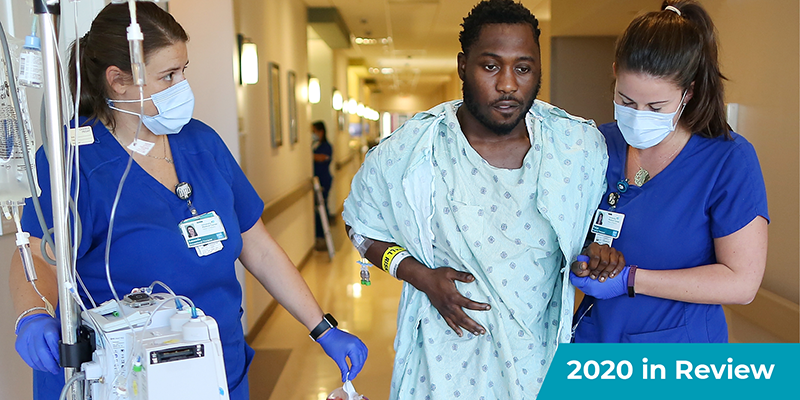By using this site, you are consenting to our use of cookies. To find out more visit our privacy policy.

The coronavirus pandemic is two seemingly opposite things at once. In many respects, it's a shared experience. At the same time, the virus has affected each of us on a highly individual level — the ways our jobs and family lives have been altered, our personal physical and emotional health, and the losses we've suffered.
During this challenging time, the value of the APTA community has been crystal clear.
We responded by doing whatever we could to support that community, from providing clinical and regulatory guidance to sharing the stories of individual members at the frontlines of the pandemic. It's a response that earned APTA recognition from the American Society of Association Executives as being among "100 Associations That Will Save the World."
We provided guidance early on.
In March, as much of the country began to take actions to reduce the spread of COVID-19, the most pressing question for the profession was how clinics and clinicians should respond.
APTA's Board of Directors immediately issued a statement urging clinicians to follow CDC guidance in terms of COVID-19 protocols but also to "use their professional judgment in the best interests of their patients and clients and their local communities." Our profession responded to the challenge in ways that reminded APTA president Sharon Dunn of our profession's response to the polio epidemic.
We kept members informed — and haven't stopped.
We immediately engaged in an unprecedented information effort to empower the profession. Over the early days of the pandemic, traffic to our website tripled as we provided trusted information.
Often working in collaboration with APTA sections and academies, we created an extensive array of online resources — clinical guidance specific to individual practice settings, outcome measures, information on the provision of telehealth-based services, and 54 COVID and telehealth webinars, all available for free.
At the same time, we offered a continuous flow of news and updates on everything from the latest on patient management to regulatory changes at the federal and state levels. Our scientific journal, PTJ, contributed to the approach by establishing a fast track for publishing relevant COVID-19 research and insights, and making that content available by way of a continually updated virtual issue.
We monitored impacts on the profession.
We tracked the impact of the pandemic and shared what we found in our report, Impact of COVID-19 on the Physical Therapy Profession.
The report, based on two surveys, demonstrated that more PTs than ever before had turned to telehealth, and that the career pride of PTs and PTAs remained strong despite the challenges, among other findings.
We found creative ways to empower our community.
The pandemic made in-person meetings impossible, yet the pivot to virtual experiences opened the door to increased participation.
With the APTA NEXT conference priced at only $20, members were able to attain up to 2 CEUs (20 contact hours), and they registered in record numbers. The virtual APTA National Student Conclave also set attendance records, nearly doubling participation at any in-person NSC.
We kept our community together by extending membership renewal grace periods and application deadlines for specialist certifications. And we used the power of our collective voice to successfully advocate for legislative and regulatory changes that provided relief and practice opportunities to the profession.
We shared your stories.
Throughout the pandemic, our members shared their stories, from big cities to rural settings, from private practices to the ICU.
They told of giving back, creating resources to keep older adults moving while insolation or using a 3D printer to create personal protective equipment.
They described what it's like to face COVID-19 as a student or to shift to telehealth.
They reflected on moments of personal triumph and the ethical questions of when or when not to provide care.
We persevered, together — and aren't stopping.
Unfortunately, this pandemic isn't over.
We're still facing challenges that test what an organization and profession is made of. But that's why we not only will survive what's before us but will thrive once we're past it — because what we're made of is a community of passionate, committed people who value each other and see the power of a shared vision and voice.
 Number of APTA member benefits and services cut back or eliminated.
Number of APTA member benefits and services cut back or eliminated.
 Percentage of PTs who said that their career pride increased during the pandemic, according to APTA's report, Impact of COVID-19 on the Physical Therapy Profession.
Percentage of PTs who said that their career pride increased during the pandemic, according to APTA's report, Impact of COVID-19 on the Physical Therapy Profession.
 Number of articles published via PTJ's Coronavirus Virtual Issue.
Number of articles published via PTJ's Coronavirus Virtual Issue.
 Number of COVID-19 and telehealth-related webinars created.
Number of COVID-19 and telehealth-related webinars created.
 Number of commercial insurers adopting temporary telehealth coverage for PTs in early 2020.
Number of commercial insurers adopting temporary telehealth coverage for PTs in early 2020.